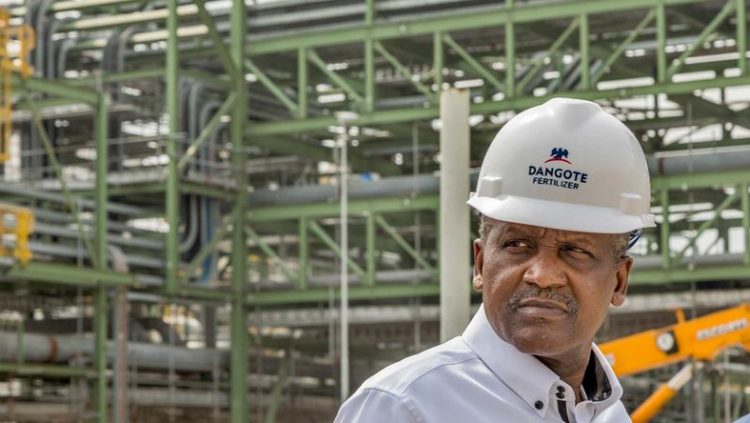Nigeria's Petrol Market: The Roles Of NNPC And Dangote

Table of Contents
- The Nigerian National Petroleum Company (NNPC): A Historical Overview and Current Role
- NNPC's Monopolistic Past and its Impact
- NNPC's Current Reform Efforts and Future Plans
- Dangote Refinery: A Game Changer for Nigeria's Petrol Market?
- The Scale and Potential Impact of Dangote Refinery
- Challenges and Opportunities for Dangote Refinery
- The Interplay Between NNPC and Dangote: Collaboration or Competition?
- Potential Synergies and Partnerships
- Competitive Dynamics and Market Share
- Conclusion
Nigeria's petrol market is a complex and often volatile landscape, significantly shaped by two powerful entities: the Nigerian National Petroleum Company (NNPC) and the newly operational Dangote Refinery. This article delves into the roles these giants play, examining their impact on fuel prices, distribution networks, and the overall energy security of the nation. We will analyze their individual contributions, the challenges they face, and the future of the Nigerian petrol market under their combined influence.
The Nigerian National Petroleum Company (NNPC): A Historical Overview and Current Role
NNPC's Monopolistic Past and its Impact
For decades, NNPC held a near-monopoly over Nigeria's petroleum industry, controlling virtually all aspects of the fuel value chain, from importation to distribution. This control had significant consequences:
- Past fuel shortages: The lack of competition often led to periods of severe fuel scarcity, causing long queues at filling stations and widespread economic disruption.
- Price volatility: The absence of a truly competitive market resulted in unpredictable and often inflated fuel prices, placing a heavy burden on consumers and businesses.
- Corruption allegations: NNPC's monopolistic position also attracted allegations of corruption and mismanagement, hindering transparency and accountability within the sector.
- The burden of fuel subsidy: The government's fuel subsidy regime, designed to mitigate the impact of high global crude oil prices, placed a substantial strain on public finances and often proved inefficient.
NNPC's Current Reform Efforts and Future Plans
In recent years, the Nigerian government has undertaken significant reforms aimed at restructuring and partially privatizing NNPC. These efforts focus on:
- Focus on deregulation: Moving away from a heavily subsidized and regulated market towards a more deregulated environment to encourage private sector participation.
- Improved transparency: Implementing measures to enhance transparency and accountability in NNPC's operations, fostering greater public trust.
- Partnerships with private companies: Collaborating with private sector players to improve efficiency and leverage their expertise in various aspects of the petroleum value chain.
- Investments in refining capacity: Increasing investment in domestic refining capacity to reduce reliance on expensive fuel imports.
Dangote Refinery: A Game Changer for Nigeria's Petrol Market?
The Scale and Potential Impact of Dangote Refinery
The commissioning of the Dangote Refinery represents a potentially transformative moment for Nigeria's petrol market. Its sheer scale is unprecedented in Africa:
- Production capacity: With a daily refining capacity of 650,000 barrels of crude oil, it's one of the world's largest single-train refineries.
- Potential impact on fuel prices: Increased domestic refining capacity is expected to significantly reduce reliance on imported fuel, potentially leading to lower prices at the pump.
- Job creation: The refinery's operations are expected to generate thousands of direct and indirect jobs, boosting employment opportunities in Nigeria.
- Foreign exchange savings: Reduced reliance on fuel imports will significantly conserve foreign exchange reserves, benefiting the Nigerian economy.
Challenges and Opportunities for Dangote Refinery
Despite its potential, the Dangote Refinery faces several challenges:
- Access to crude oil: Securing a consistent and reliable supply of crude oil is crucial for sustained operation.
- Logistical challenges: Efficient transportation of refined petroleum products across Nigeria's vast network presents a logistical hurdle.
- Competition with NNPC: The refinery will inevitably compete with NNPC in the downstream sector, impacting market share and pricing strategies.
- Government regulations: Navigating the regulatory landscape and ensuring compliance with government policies will be critical for its success.
The Interplay Between NNPC and Dangote: Collaboration or Competition?
Potential Synergies and Partnerships
The coexistence of NNPC and the Dangote Refinery presents both opportunities for collaboration and potential for competition:
- Joint ventures: Strategic partnerships could leverage the strengths of both entities, leading to improved efficiency in refining and distribution.
- Shared infrastructure: Sharing infrastructure, such as pipelines and storage facilities, could optimize resource utilization and reduce costs.
- Optimized distribution networks: Collaboration on distribution networks could ensure wider reach and more efficient delivery of petroleum products across the country.
- Technology transfer: Knowledge sharing and technology transfer could enhance the overall technological capabilities within Nigeria's petroleum sector.
Competitive Dynamics and Market Share
The relationship between NNPC and Dangote Refinery is likely to be a complex mix of collaboration and competition:
- Market share competition: Both entities will compete for market share, potentially leading to price adjustments and intensified competition.
- Price wars: A potential downside of increased competition is the possibility of price wars, which may have short-term benefits for consumers but could also affect the profitability of both players.
- Potential for increased consumer benefits: Increased competition could drive innovation and potentially result in better quality products and services for consumers.
- Challenges to market dominance: The emergence of Dangote Refinery challenges NNPC's historical dominance, fostering a more competitive and dynamic market.
Conclusion
The Nigerian petrol market is undergoing a significant transformation, driven by the ongoing reforms at NNPC and the emergence of the Dangote Refinery. While both entities present opportunities for improving Nigeria’s energy security and affordability, challenges remain. The success of this transition hinges on effective deregulation, increased transparency, and strategic collaboration between the public and private sectors. Efficient refining capacity is crucial for ensuring affordable and readily available fuel for the Nigerian populace. Understanding the intricate interplay between NNPC and Dangote in Nigeria's petrol market is crucial for navigating the complexities of this vital sector. Stay informed about developments in the Nigerian petrol market and the ongoing efforts to improve fuel accessibility and affordability. Further research into the impact of these key players on the Nigerian economy is highly recommended.

 Newark Air Traffic Control System Failure Prior Safety Incident Warnings Ignored
Newark Air Traffic Control System Failure Prior Safety Incident Warnings Ignored
 Unprovoked And Cruel The Impact Of A Racist Killing On A Family
Unprovoked And Cruel The Impact Of A Racist Killing On A Family
 Changes To Uk Visa Applications Nationality Based Restrictions
Changes To Uk Visa Applications Nationality Based Restrictions
 Trump Weighs Action On Migrant Detention Challenges Legal Ramifications
Trump Weighs Action On Migrant Detention Challenges Legal Ramifications
 Deutsche Banks New Deals Team Targets Expansion In The Defense Finance Sector
Deutsche Banks New Deals Team Targets Expansion In The Defense Finance Sector
